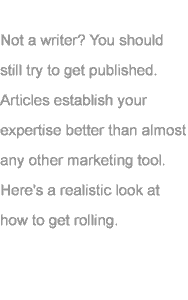|
By
Kristen Paulson and 1099 Staff


|
|
You hear it from those bumblebee-colored Dummies guides,
from popular online columnists,
even from Lexus-driving, Rolex-wearing consultants. They all say that
getting published is an IP's best friend. For example, Consulting
for Dummies cheerfully suggests: "Writing articles… on your
field of expertise is a great way to build your credibility and get
your name in front of a wide range of potential clients." Makes it sound
as though writing and publishing is as easy for non-professionals as
a Sunday drive in the country: you motor from query
letter to composition to publication, and end your little tour in
the land of high-paying clients and speaking gigs.
They're half-right. Writing articles can be a great way to market yourself.
But what they don't tell you is that writing for publication can give
you epic migraines, lead you to ignore your real work, and leave
you with no more clients, or cash, than you had before you began. Now,
1099 loves you, and we want to see you succeed, but we think
that you should know what's really involved in writing and publishing
an article before your start clicking away at your computer keyboard.
Writing
Is Hell
Novelist William Styron speaks for many writers when he says: "I get
a fine warm feeling when I'm doing pretty well, but that pleasure is
pretty much negated by getting started each day. Let's face it, writing
is hell." Writing, in case you haven't heard, is difficult, time-intensive
work. If you aspire to get yourself onto the pages of a professional
magazine, be prepared to revise your words over and over until you arrive
at the clearest, most appropriate sentences possible.
|

Want
to be published? Be prepared to revise your words over and over
and over again.
 |
|
Magazine publishing generally works like this: a writer works
and reworks his words until he tells his editor, "This piece is
unimproveable." Then the editor responds with a list of changes
-- like pointing out that "unimprovable" isn't a real word. The
writer curses, sighs, and then sits down to rewrite. (Of course,
some low-end publications -- obscure trade journals and newsletters
-- will accept first-draft work merely to fill up pages. But chances
are, you won't find many high-quality clients by writing for lousy
publications.) Monique Cuvelier, Managing Editor of Literal
Mind, a fine online literary mag, says that the articles she
publishes typically go through three rounds of editing. And sometimes
she goes even further: "I work with one person who doesn't have
any formal training as a writer, so I spend a lot of time sculpting
stories with her. It's worth it to me, though, because she's got
fresh ideas and I like her approach."
All of which brings up a big, bad question: Can you afford to
shove aside your tax consulting/computer programming/photography
to spend a bunch of non-billable hours tidying up your writing?
If so, great; if not, then it might be smart to forget about publishing.
Actually, you have a third option. You can pay a hired pen to
whip your less-than-ideal words into shape. There are many writers
and editors floating around in the free-agent universe who'd be
glad to give your prose a hand. And while we approve of handing
off work to another IP, we also offer this caveat: having
someone else do the writing for you takes much of the fun
out of getting into print.
Kenny
Rogers Ain't the Only Gambler in Town
Let's say you want to write your own stuff. What are the
odds of your taking it public? Well, they're not as great as the
publish-and-flourish folks suggest. The publishing game, particularly
for a non-professional like you, is a gamble. You're betting that
your idea will attract the right editor, and the right readers
-- and that your untutored writing skills and professional experience
will be enough to get you noticed. Fortunately, there are
ways to improve your chances of getting published. Here are five
of them:
- Pick up a book. As an expert in your field, you probably
have loads of hands-on experience -- but experience alone won't
get you published. You have to explain what you know in a clear
and appealing manner. One of the best ways to learn how to do
this is to study the classic texts in your field. Our advice
is to go to the library, find the people who have written best
about your profession, and read their work. Carefully. It isn't
just a matter of paying attention to an accomplished writer's
structure and style: it's also about credibility. Since you've
never published before, your name and opinions are unknown quantities
-- but if you can show a familiarity with the most capable writers
in your field, you can gain an editor's, and then an audience's,
trust. Note: this doesn't mean that you should quote
with uncritical approval all the stuff that the recognized experts
have published. In fact, making an intelligent argument against
a well-respected writer is an excellent way for an IP author
to slip into print.
|

Before
you write your query, be sure that the magazine you're aiming at
hasn't already run a similar story.
 |
|
- Check the calendar. 1099's Linda
Formichelli suggests that all you need to do is pull down
a stack of magazine from Borders' magazine rack or flip through
the Writer's Market, and then you're ready to publish
your brains out. This isn't the whole story. A day at the superstore
and/or a quick read through the latest Writer's Market
is a solid beginning, but it must be followed up with further
research. Look into what your favorite magazines have printed
in the last year or so, and see what they plan on publishing
in the future. A magazine will often publish its back
issues online and will insert an editorial calendar in their
media
kit. Be sure, before you start pitching your idea,
that the magazine you're talking to hasn't run, or isn't planning
to run, anything that's too close to what you've cooked up.
- Know your readers. Who would you like to read your
article? If you pick a magazine whose readership would make
poor clients, or one that has too small an audience, then you
might not get all you want out of your adventure in publishing.
You learn a lot about a magazine's typical readers -- their
professions, their concerns -- by turning to the letters-to-the-editor
section. Go there and you'll see what topics the readers complain
about, and then write a proposal for an article that addresses
their complaints. Or spend some time studying the magazine's
advertisements; try to discover what goods and services readers
are interested in buying (you want them to buy your services,
no?). Or you can turn, once again, to the magazine's media kit.
Media kits usually include a healthy amount of data about a
magazine's readers -- age, occupation, income, etc. -- as well
as important circulation and editorial information.
- Be a waiter. Publishing may not pay off immediately.
A lot of trade magazines (which are the places that will most
likely publish your stuff) don't pay much -- if at all. Even
if your work gets accepted, it will be some time before it gets
released to the public -- some magazines have notoriously slow
turn-around times -- and you may have to keep twiddling your
independent thumbs even after it has been published. Don't expect
to see any direct return on the time and effort you've put into
writing your article. Your payoff should come later, after
readers peruse your work, and they hire you for a writing or
consulting or speaking gig. The painful truth is that this may
never happen at all. Be patient with the process. Editor Cuvelier
says: "Nothing irritates me more than someone who writes every
week asking, 'Did you get the pitch letter?' Or 'When is my
story is going to appear?' Or 'Do you have any questions?' This
says to me that the writer isn't so easy to work with."
- Be query persistent. The rah-rah school of publishing-as-marketing
suggests that all you need to do is throw together one query
letter, send it out, and you'll be in like Updike. This is misleading.
Truth is, your query letter may only elicit a form-letter response,
or worse, no response at all. You have to be prepared for this
if you want to be published. The trick is not to take it personally.
Eric Martin, a contributor
to 1099 and other magazines, says that he gets a 30-percent
response rate with his queries, which is very high indeed. What's
he doing right? Eric says he puts a lot of time, effort, and
energy into writing his query letters.
If
You Can Take the Heat
So now you've got the skinny on getting yourself published.
You've been forewarned about what to expect from the wonderful
world of writing and publishing. Think you can handle the work,
the rejection, the rewrites, and the waiting? Then what are you
waiting for? Get writing!
|
|



